 Research Update
Research Update
04
December
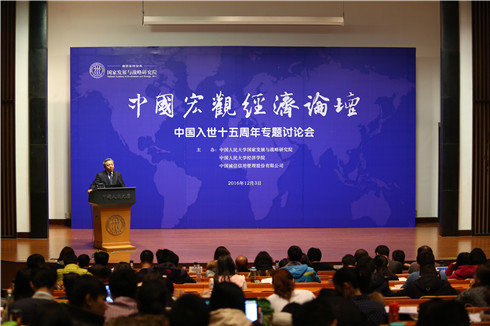
On December 3, 2016, “China Macro Economy Forum: Symposium on the 15th Anniversary of China’s Accession to the WTO”, jointly organized by National Academy of Development and Strategy and School of Economics, Renmin University of China (RUC) and China Chengxin Credit Management Co., Ltd. was held in RUC. The symposium was themed “New Opening-up Strategy and the Reconstruction Process of Global Trade Rules: Reflections and Prospects at the 15th Anniversary of China’s Accession to the WTO”.
After 15 years of negotiations on “rejoining the GATT” and “accession to the WTO”, China officially became a member of the World Trade Organization (WTO) on December 11, 2001. As time flies, China has joined the WTO for 15 years. Review of the past, reflections on the present and prospects of the future from the perspective of the launch of the “new globalization” and reconstruction of global governance rules allow us to sum up the experience, learn lessons, more actively grasp historical opportunities and deal with challenges of the times, and thus more productively participate in international economic activities, help making international rules and even influence the process of globalization.
Present were experts and scholars including Wu Xiaoqiu, Vice President of RUC; Du Houwen, the former Vice President of RUC and Vice President of China Society of World Economics; Tang Yihong, Dean of School of International Trade and Economics, Central University of Finance and Economics; Li Kunwang, Deputy Director of Office for Strategic Development & Research, Nankai University and Editor-in-Chief of Nankai Economic Studies; Sun Jie, Research Fellow at Institute of World Economics and Politics, Chinese Academy of Social Sciences and Director of Editorial Department of The Journal of World Economy; Liu Yuanchun, Executive Dean of National Academy of Development and Strategy (NADS), RUC; Lei Da, Research Fellow at NADS, RUC and Professor of School of Economics, RUC, and Wang Jinbin, Research Fellow at NADS, RUC and Deputy Dean of School of Economics, RUC.
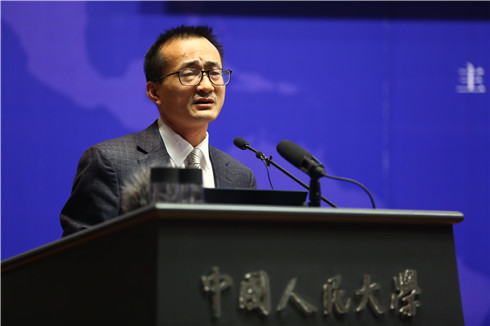
The first unit of the symposium was presided over by Liu Yuanchun, Executive Dean of NADS, RUC.
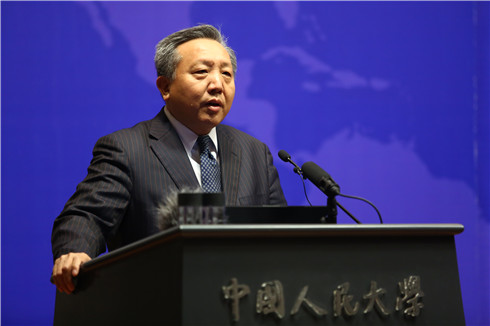
Vice President Wu Xiaoqiu of RUC extended his warm welcome and heartfelt thanks in the speech to guests present. He said that as a special session of China Macro Economy Forum, the Symposium on the 15th Anniversary of China’s Accession to the WTO reflected high attention paid by the academic team of the Forum to social hot spots and macro-economic situation in reality, and the Forum’s pragmatic attitude of scholarship of being established in Chinese national conditions and making use of academic and discipline strengths to provide advices and suggestions for national economic and social development. China Macro Economy Forum adheres to applying research findings and academic opinions to the great practice of developing China’s economy, with its academic influence expanding day by day, and has become an important academic brand of RUC and an important achievement and symbol of RUC’s building of a “national high-end think tank”. Vice President Wu Xiaoqiu mentioned that since China officially became a member of the WTO on December 11, 2001, it had been adhering to combining enjoying rights with fulfilling obligations and realizing its own development with promoting the world’s common development, actively participated in economic globalization and provided unprecedented opportunities for the rest of the world to develop their economy and trade. He also pointed out that the current international situation was undergoing earth-shaking changes, the world trade pattern was also experiencing great changes and WTO negotiation mechanism was gradually giving way to regional and bilateral free trade agreements, so experts and scholars should provide advices and suggestions for how China should deal with the reshaping and change of the international trade system.
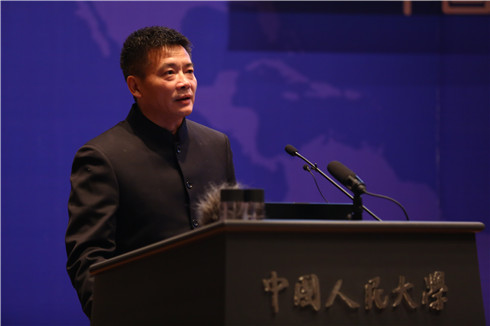
Lei Da, Research Fellow at NADS, RUC and Professor of School of Economics, RUC released the main report of “New Opening-up Strategy and the Reconstruction Process of Global Trade Rules: Reflections and Prospects at the 15th Anniversary of China’s Accession to the WTO” on behalf of the research group.
The report indicates that since China joined the WTO, it has witnessed unforeseen great changes and has been deeply integrated into global economy. China has energetically grasped strategic opportunities, actively been adapted to and fully participated in exploration of an all-around opening pattern, and has been actively involved in the wave of global economic governance and shouldered responsibilities and missions given by the world. Over the past 15 years, China has made significant achievements in three aspects, i.e., deep integration into global value chain, system reform and participation in global economic governance. Firstly, global value chain, as a noteworthy feature and high-level form of the current economic globalization, marks that economic globalization has entered the era of deep integration of resources, posing new requirements on further opening-up of different countries. The degree of China’s deep integration into global value chain is mainly embodied as rapid development of trade and international investment, change in mode of trade and industrial structure. China’s deep involvement in adjustment to global value chain is not only an intrinsic requirement to realize the transformation from an economic and trade nation to an economic and trade power, but also the only road for China to actively participate in the reshaping of international economic and trade rules, which will enable China to greet important opportunities for economic development. Secondly, China has made great achievements in system. China has broken the monopoly over the power to engage in foreign trade, which has been subject to registration system instead of examination and approval system in the past, and cancelled threshold restrictions to allow all market players that comply with legal procedures to be subjects of foreign trade, marking that China’s reform of the power to engage in foreign trade has been completed; China has earnestly fulfilled the promise of tariff concession for accession to the WTO and China’s open economy has transformed from “multilateral opening” and “bilateral opening” to “unilateral opening”, with the three showing benign interaction and coordinated development; China has built a pilot free trade zone, further promoted the reform and opening-up in new circumstances and facilitated point-to-area development in different regions; China has successively modified and revised relevant laws and regulations in financial service industry, laying a good institutional foundation for full opening of the financial market. Finally, China, as the largest developing country and especially a recognized global economic power, has made great contributions to world economic recovery, with its comprehensive national strength, global influence and international status being further improved. The rising China has been pushed to the foreground of global governance and become a new focus of global governance. China has been participating in global governance under the overall strategy guided by and centering on active participation in global economic governance and as a responsible power, actively assuming its due responsibilities and playing a positive role in advocating and innovating the idea of global governance, guiding global economic agenda, participating in preparation of international rules, boosting regional economic and trade arrangements, etc.
The unfolding and deepening of global value chain is the main impetus for high growth of global trade and investment over the past 30 years, while it is by grasping the opportunity of the development trend of economic globalization that China has rapidly risen to one of the world’s leading trade nations and economies. However, there are signs that at the occasion of the 15th anniversary of China’s accession to the WTO, large-scale unfolding and deepening of global value chain in this stage has come to a conclusion. Compared with the situation 15 years ago, what we will be faced with will be a brand-new development environment of economic globalization and more complicated problems.
Firstly, the position of manufacturing industry in global value chain is to be urgently promoted. The average degree of GVC participation of China’s manufacturing industry is 0.276 at present, with the degree of GVC participation through export of indirect value added (forward GVC) being 0.112 and the degree of GVC participation through import of overseas intermediate goods (backward GVC) being 0.164. Thus, China’s manufacturing industry can be considered to participate in international division of labor mainly through import of overseas immediate goods, that is, China’s manufacturing industry still regards backward GVC as the main mode of GVC participation, indicating low degree of GVC participation. The average GVC division of labor status index of China’s manufacturing is -0.046, which is negative, indicating that China’s manufacturing industry has a comparatively low status in GVC division of labor.
Secondly, Chinese enterprises are faced with strong external impacts. Since the reform and opening-up, China has seen remarkable economic growth, but compared with developed countries, China’s economy remains backward. Problems such as generally weak economic strength, irrational industrial structure and single trade structure are still prominent. Accession to the WTO means further deepening of China’s opening-up and requires significant tariff reductions and fewer non-tariff barriers, allowing more overseas products and services to enter into China, intensifying competition in domestic market and impacting different industries to varying degrees.
Thirdly, trade frictions are increasingly severe. The WTO is set up to mainly advocate free trade in the future. Since China accessed to the WTO for rapid trade development, especially, “New Mediocre” global economy, various trade barriers occur and pose unprecedented challenges to China’s trade.
Fourthly, domestic society is greatly impacted. First of all, as developing countries are subject to delay in environmental legislation, they are passive in trade and environmental issues. China is still in the awakening of environmental awareness and thus has weak environmental awareness, with relevant environmental laws and regulations to be perfected, and environmental protection technology and industry just starting; compared with developed countries, China is weak and disadvantageous in competition. Secondly, rapid expansion of export and influx of foreign capital after accession to the WTO have promoted industrial structure evolution in China, and a large number of labors have transferred from the agricultural sector to manufacturing and service sectors. Increase in non-agricultural jobs creates employment opportunities for young people, changes opportunity cost and expected return of educational investment and affects individual educational investment decision-making, with educational investment of many young and middle-aged people staying at the level of secondary education, impeding accumulation of human capital. Human capital accumulation is the impetus for long-term economic growth, and if such situation continues, China will be faced with the risk of falling into the “secondary education trap”, which is not good for medium- and long-term economic growth. Thirdly, with rapid development of China’s economy and wider urban-rural gap, an increasing number of rural residents begin to voluntarily rush into coastal areas and be engaged in trade-related labor-intensive industry or relevant industries, rendering left-behind children in rural areas to continue to increase. Practical attention and solution to the problem of left-behind children in rural areas not only concern healthy growth of these children, but also concern the overall quality of rural population and, more importantly, harmonious and sustainable development of society as a whole. The problem of left-behind children is a part of the cost and price we pay in the process of social transformation, while rapid expansion of China after its accession to the WTO has also worsened the problem gradually.
With the evolution of global economic and trade mode, global trade governance system and international trade rules system are also undergoing constant change and development. Global trade governance system has experienced different stages such as multilateral governance, regional governance and emergence of plurilateral governance. Global trade governance rules, initially made at the times of GATT, have undergone four stages of development and change so far:
The first stage features the focus on goods trade. As major developed countries achieved rapid development of industry after the WWII, in order to expand the global market, reduction of goods trade tariff became the primary task of the multilateral trade system.
In the second stage, service trade and intellectual property rights were included in trade rules. In the 1980s, developed countries witnessed rapid development of service trade and increasingly serious problem of fake goods in trade. Under the leadership of the USA, issues such as service trade and intellectual property rights were included in the eighth round of negotiations on the multilateral system (Uruguay Round). In 1995, General Agreement for Trade of Service and Agreement on Trade-Related Aspects of Intellectual Property Rights were finally concluded in that round.
In the third stage, more issues on domestic policies were included in the international rules system. The Doha Round Negotiations launched in 2001 covered about 20 issues, among which agriculture and market access for non-agricultural products were concerns of developing countries while with active promotion by developed countries, issues more related to domestic policies of a country, such as investment, labor, environmental protection and competition policies, among others, were brought into the scope of discussions on international trade rules.
The fourth stage features higher-standard international trade rules. Rules in this stage are represented by TPP and TTIP under negotiation. In view of the current trend, promotion of market opening and reduction of trade and investment barriers represent the basic direction of the new round of restructuring international trade rules, with the scope of new rules extending from traditional border measures to behind-the-border measures and investment rules being priority among priorities.
In the face of the evolution of global trade governance system framework and global trade governance rules, China adheres to earnest and positive response. In 2013, China initiated the “Belt and Road” Initiative, began to provide public goods for construction of global trade governance system and sought to play a leading role in global governance. The proposition of the “Belt and Road” Initiative has broken through the current method to make rules, which does not emphasize formal multilateralism or regionalism, but depends on existing mechanisms, whether bilateral, regional or otherwise, to practically proceed. The characteristic conforms to objective conditions of developing countries along the “Belt and Road”, and the Initiative represents system building from the perspective of development.
Focusing on prospects of China’s new opening-up strategy, the report also points out that both multilateral and regional trade systems are faced with great difficulties and challenges at present. Such a situation results in that trade and investment liberalization loses intra-country and inter-country consensus and support, so it is not appropriate to promote large-scale and global trade and investment liberalization at present. The primary goal of China’s boosting global trade governance remains promoting WTO Doha Round. At present, China has the strength and conditions to actively assume the responsibility of a major bidder in Doha Round and push for an end to Doha Round as early as possible. Under the circumstances where the USA and other developed countries cannot make attractive offers while emerging powers are not willing to make any offer, it is hard to reconcile the contradictions between the two and cover the gap in expectations for each other. In fact, China has become the only member that is able and possible to make key contributions and, at the same time, drive developed countries and other developing countries to make modest contributions. Secondly, China should be open-minded to the new form of “new globalization” and support negotiations in a plurilateral way. This can not only prevent the agreement from being completely manipulated by developed countries represented by the USA, but also reflect China’s determination to actively open to the outside world and the right to make international trade rules. Finally, China’s free trade zone strategy should be provided with targeted arrangements and strategies in implementation. As the world economic development situation is complicated and constantly changing, national leaders all over the world are seeking policies and schemes that are suitable for them and can promote maximized well-being in their countries; however, there is no universal norm that can tell us the future direction. All explorations regarding international relations and foreign policies are the process of trial and error, and the “Belt and Road” Initiative, establishment of Asian Infrastructure Investment Bank and implementation of the free trade zone strategy imply trial and error, but in the process of trial and error, we can constantly approach the optimal strategy and realize the Chinese Dream of interior and exterior harmoniousness, wealthy nation and powerful people.
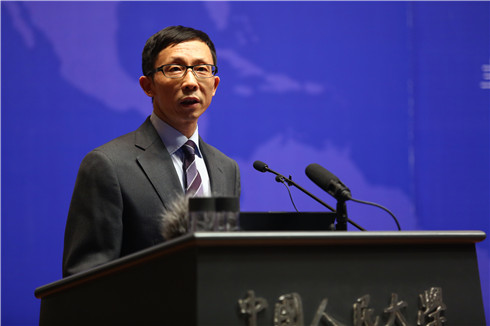
The second unit of the symposium was presided over by Wang Jinbin, Research Fellow at NADS, RUC and Deputy Dean of School of Economics, RUC, at which experts and distinguished guests present had in-depth discussions and exchanges about relevant issues to the 15th anniversary of China’s accession to the WTO.